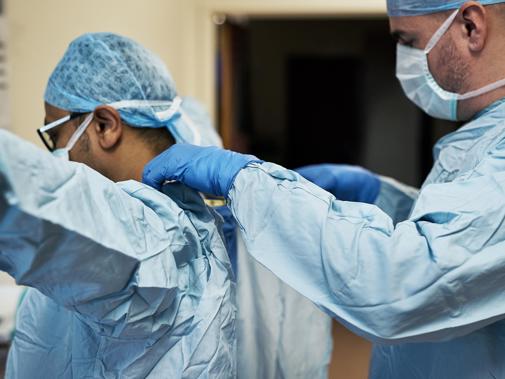Things have been getting steadily busier recently in my roles as a GP lead for one of the COVID-19 assessment centres and as an OOH (out-of-hours) GP.
In OOH, shifts are getting close to normal levels of work again. There have been quite a lot of people presenting with mental health problems over the last few months and many of these seem to be a bit more serious than normal. It is difficult to tell how much of this is directly related to COVID-19, but I certainly recall a lot of patients saying that worry about infection was worsening their anxiety levels and the lockdowns have affected their ability to access the same levels of support that they would normally have access to.
Patients and relatives are still worried about going into hospital for fear of catching COVID-19, or for fear of not seeing their relatives again if they are admitted. I've had quite a lot of people refuse to go to hospital owing to these fears or refuse to let their relatives go to hospital. These conversations can be difficult enough as there is often little we can offer them for treatment in the community.
There seems to be more staff affected this wave, at least in primary care, compared with the first wave. It is causing problems for staffing normal services and I know of practices that have been severely impacted by staff absence owing to infection and isolating.
I get the impression the public is not as worried about things this time compared with previously. We frequently find patients who have been referred to the COVID-19 centre are still going into work and going out to the shops despite having symptoms suggestive of COVID-19. Some patients seem annoyed at us when they contact us describing symptoms suggestive of COVID-19 and we advise them they need to self-isolate after.
It is quite disheartening to see the repeated complaints online about GPs not being open and not seeing patients, or that recently the Eds (emergency departments) have been busy because of GPs not working. The EDs are busy in part from the knock-on effect of complacency setting in among some sections of the public – some have stopped taking the pandemic as seriously as before, stopped isolating themselves despite having symptoms, stopped wearing masks and socially distancing themselves. GPs have been open continuously throughout the pandemic which places themselves and their families at some risk.
They have been running their normal practices, arranging flu vaccine clinics and staffing COVID-19 centres and GP OOH centres. More work has been done by telephone or video than normal, but these are still consultations designed to assess and treat patients. Footfall in practices was reduced to try and keep staff and patients safe, to protect them from becoming ill and to keep the service running. Patients have been seen when needed and when safe to do so. Those with COVID-19 symptoms, or isolating owing to contact with COVID-19, have been getting seen in a COVID assessment centre when needed. I suspect many of those complaining about GP surgeries simply do not understand or are unaware of how general practice has adapted to cope with the pandemic, how surgeries are still open, but that doesn't make it any nicer to hear.
I'm not aware of any practices that have closed completely. If that were to happen, I expect it would be owing to staff illness and certainly not staff being lazy or uncaring.
It’s been a long time without much of a break for everyone and it is taking its toll. Everyone is tired, people have been working for months without any holidays or time off. Morale is lower than normal, and it wasn't great to start with. Complaints, often incorrectly and unfairly, about GPs not working contributes to this. It has not been an easy time for society generally, with many people having money and job worries, as well as concerns for their health or their family's health, but blaming health care staff for some of these problems is just the wrong approach and is very demoralising to those who are really trying their best to help.
I think the next few months will depend greatly on what lockdown measures are taken and on how well people follow the advice. We saw COVID-19 numbers drop significantly during the last lockdown period, but they'll likely climb again afterwards if nothing in the background changes – if some people are still careless and do not consider other people's wellbeing as well as their own. Without widespread following of the basic rules – avoiding crowds, maintaining social distancing, wearing masks, frequent handwashing – I see the pressures on the healthcare system continuing and likely returns to lockdown as numbers bounce up and down.
Some of this is beyond our control, but I wonder if people do not realise how much of an impact their own behaviours contribute to the overall pattern, and therefore how much of this is actually within some degree of control. No one really wants more lockdowns/restrictions, but we all have the ability to help control the spread of the infection and therefore influence how necessary future lockdowns might be.

